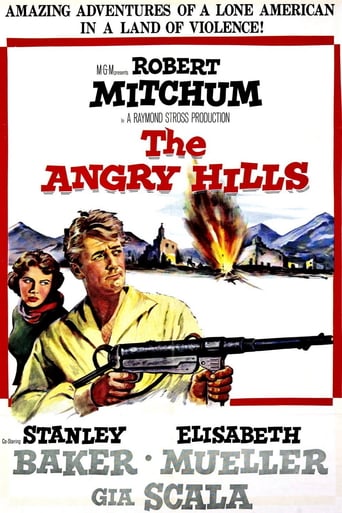Cristi_Ciopron
Droll scenes, broken storyline, ridiculous villains, a yummy actress (Gia Scala), Mitchum not soaked by the general silliness, and Aldrich severely clueless. Directed by Aldrich and starring Mitchum, it's an uninspired, eerily misdirected war _actioner, often droll, as if a half-wit hired Aldrich, Mitchum, Goring, Cabot, Bikel, Baker, to see this movie done, like someone's ambition came through, say a war movie by E. Wood, the lousiest scenes are saved for Heisler (head of the Gestapo in Athens), the undecided mother and the fat benefactor; the twists seem bizarrely inefficient (when the car shows up at the nunnery, I gathered the Gestapo sent it, but it didn't, the double agent broad, Lisa, was merely acting on her own, only then do the Gestapo try to convince her), the gimmicks look childish and unlikely (Heisler's map, also Mitchum's attempt to shoot the Gestapo head, then the fooling of Tassos …), the Germans track Mitchum in the hut where he hided, but aren't able to arrest him when the broad hosts him in Athens …. Both script and, save Mitchum, Goring and the Greek girl, acting are uncannily clumsy, with a random storyline and unlikely scenes meant to look intriguing, many scenes have a droll look, and the character seem sly-boots, jokers, hoaxers. This movie disappointed me, the director and the cast looked promising, though the title almost gave away the silliness; there are a few nice scenes, till the Germans step in, and the warrior (who is in fact a foreign correspondent, and remains mysterious till the finis) wakes in Elefteria's house, but even these exciting initial scenes, from Mitchum's arrival in Athens (it remains undecided whether he was only pretending to be an officer) until his jumping in an army car, have droll forebodings (like Tassos spying at Mitchum's door, or Mitchum leaving the museum unharmed). I don't believe I have ever heard about it before finding it, and in this situation it seems reasonable. Aldrich deserved a spanking for angering those hills. Perhaps less for giving a wholly positive image of the Greek patriotism and life in the country, with the nunnery meant to give Western audiences a sense of familiarity, and endearing, though later entirely anti-ecumenical, Greek priests.Mitchum's true job, the officer with whom he spends his evening in a cabaret, Lisa's arrival at the nunnery, Mitchum's secret presence in Athens, the benevolent and useful pawnbroker are random items in a zany, aimless plot. Heisler and Lisa are supposed to reveal puzzling depths. The actors who embody them are the most deluded of the cast. If the comic book intrigue is derisory, the melodrama is sick. Aldrich earned himself a spanking.Yet somehow, Mitchum alone manages to be likable, with his coolness, nonchalance and handsomeness, in this hallmark of phoniness and unbelievable nonsense. I wrote Mitchum alone, but I should mention also Elefteria, played by the yummy Gia Scala. And there's also a 3rd actor.Goring, as colonel Oberg, does an enjoyable role as an eerie sickly officer, outspoken, who complains about the leader's campaigns and about his own shattered health, a role wasted on this formless silliness.Cabot is the fat pawnbroker, Th. Bikel is Tassos (a comic book henchman of the Gestapo); like Goring as the hypochondriac colonel, they seem to believe they act in a comedy. The plot is so childish, unconvincing and thoughtless, that it could of been an instinctive choice of subverting it. The drollest scenes belong to E. Muller and Baker, as Lisa and Heisler, both with delusions of fine acting; on the other hand, Mitchum misread Heisler, who, though from a nation bent on killing an entire other nation, shows unexpected largeness, so he's not the heartless wretch his enemy supposes him to be. Mitchum's outburst of anger when he finds out about Lisa's story and kids is his critique of the movie, at least of its plot.
jaykay-10
The opening developments in this picture are promising in the manner that Hitchcock so often exploited: an innocent bystander finds himself in the wrong place at the wrong time, and is drawn into intrigue of which he has no prior knowledge, and in which he has no interest. But he has something that the villains want - while all he wants is to get out of the situation alive. So far, so good. It is not long, however, before the complications give way to standard action fare, the emphasis now being on hiding, getting away, deciding who is trustworthy - elements used many times in many pictures, some better, some worse. Ultimately, the story disappoints. There are rewarding performances by steely-eyed Stanley Baker, and sweaty, cowardly Theodore Bikel. Robert Mitchum plays the lead role with competence, if not distinction.

